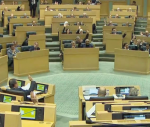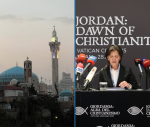You are here
Is our fear of ‘popular sovereignty’ trumping our political will to encourage political parties?
Apr 28,2018 - Last updated at Apr 28,2018
The people blame the government for actively scuttling any credible effort to organise politically in order to maintain control of all political processes under the excuse that citizens are not able to behave responsibly. The political “elite” counter blames the “people” and accuses them of apathy, seeking personal gain, lack of organisation and by deduction, therefore, political immaturity.
That debate is not unique to Jordan. Similar discussions and mudslinging occur in developing countries globally. Governments restrict democratisation processes pending guarantees that political “teaming” or organisation will not bring change that “cannot be managed” or would threaten the stability of the country.
In other words, the government seeks to extract guarantees from politicians that their activism, within a designated margin of freedom, will not demand “popular sovereignty”, where the authority of the state and government is created and sustained by the consent of the people through their elected representatives who are the source of all political power.
We had such a discussion a few days ago. Why is it that Jordan has failed to produce credible political parties that are able to adopt and push forward ideological or programmatic platforms? I came away from our small discussion fully convinced that we are failing because there are no incentives or rewards to encourage people to organise or create teams around national political issues or reform ideas.
Common wisdom per theories of political parties assumes that a political party is an ideological or programmatic framing body to a team of politicians whose ultimate goal is to win elections, and as elected officials, ultimately form government. These teams attract support among the citizens, by making promises about what they will do if they are elected whether as parliamentary blocks or if leading a majority or decisive blocks in government. Their reelection or continued popularity become dependent on their records in implementing their promised programmes.
In that process, they are scrutinised by voters who express their satisfaction and dissatisfaction through the ballot box and a media that unpacks, discusses and challenges their programmes and performance in order to help inform the public and keep the elected officials conscious of their constituencies’ priorities. Their elections systems are age old and mature and, by deduction, political parties are similarly experienced and constantly reflective of citizens priorities and moods.
Examine the process here in Jordan. Let us start with Parliament. The elections law is changed every few years in a clear ploy to pre-empt the formation of cohesive, negotiated, demographically representative and politically driven teams.
It is murmured in our ears, and through the political rumour mills and salons, that this political manoeuvring by the government is to safeguard us from the growing power of the uniquely organised Islamists, who may take over our parliament, challenge our social norms, shake our demographic makeup and deliver us into the hands of the religiously zealous or those of different origin, who lurk within their ranks.
So, districts are demarcated to allow the natural selection of pre-determined and approved winners, all individuals, all politically weak or empty and all without programmes. We allow a few vocal “disruptors” in because they add political colour but they, being disparate individuals, certainly do not improve the image of parliament as a body.
We then poke fun at these “service-oriented” and “barely elected” individuals. We undermine them, show them up and make sly remarks about their corruption and subservience to government dictates. We render them useless and unnecessary, sometimes going as far as to claim that we do not need them and that they are a financial and logistical burden. We the people and the media become partners to this plan as we contribute to sullying the reputation of any political teams seeking to emerge in parliament. The rumour mill feeds the narrative as we digest rumours and repeat them without real scrutiny of their credibility.
Look at how we keep potential political leaders out: the youth we manage by denying the under the 30 from running for a seat and by supporting a tribal system that honours the elders and dismisses the voice of youth; organised civil society activists from main city districts can only pitch their programmes in politically-savvy, but impossible to win, districts in main cities or they must wipe the dust off their tribal credentials to compete in rural areas (if they even have those credentials) where they may not have the social capital, language or access to power; essential for delivering services to their communities, to capture the imagination of the voters there.
Women are burdened with a double challenge to their agency as potential political actors: one at their community level where the support of the traditional patriarchal units of family and tribe, at which these elections decisions are made, primarily goes to male candidates, but also with the architects of the elections law whose design of the quota distribution favours candidates in rural/tribal districts in effect, producing female parliamentarians, who not only are not as politically savvy but also have no choice but to be the representatives of the — usually smaller — tribes who put them in power rather than act as champions for women’s issues and empowerment programmes.
The elections law is skilfully designed to limit opportunities to deliver parliamentary candidates with national level political outreach, youth leaders giving voice to the priorities of their generation, activists who have the tools to advocate for social change and women, whose leaders are skilled and passionate but are jeopardised by the patriarchal challenges to women’s agency and empowerment. Those groups would have been our target groups for political empowerment if we honestly had the political will to incentivise citizens to form or join political parties. But in reality, they are the groups that the law discriminates against by design.
Political parties, clearly, are left with no programmatic or ideological in-roads in this convoluted process that appears to be built solely to empower individuals from important tribes or, increasingly, moneyed backgrounds (but that is another story). They are not left with any visible rewards with which to lure possible followers. The tribal leaders already have an accepted and well-recognised social and political framework to place them in power, what would be their incentive to jump off that ship and get into a sinking boat? Clearly the parliamentary route is not providing that internationally recognised reward to incentivise the formation of credible political parties.
Now, let us look at the government (i.e. the executive authority) and let us quickly assess whether it — unlike parliament — offers the possibility of reward for political parties as per the theory described above. The government in Jordan is formed through an impressive — and quite perplexing — process of selection.
The invisible hand of the government architects — any government — reaches over the heads of Parliament, elected bodies and any recognisable political “teams”, and picks individuals.
Those individuals have little or no political background or training and their legitimacy is not supported by any political justification that is legitimately recognised in the world of political behaviour. They are mostly random individuals who wiggle their way to the top based on their individual merit. That merit could be respected and accepted, as in the case of technocrats and experts needed for mostly technical ministries, or it may be a distorted merit system similar to the one employed by the elections law that favours geographic and demographic considerations.
There, honestly, is not a single reason I can think of that would incentivise any individual in Jordan to prime himself for selection to a government position through the route of membership of political parties. If anything, that route is thankless, denigrated, disrespected and basically a hard slog. I can pick on one hand the number of political personalities who came to the limelight through that route.
To conclude, although this topic opens a Pandora’s box of arguments and counterarguments, demands that Jordanians organise themselves into political parties requires closer scrutiny of our motives and tools to achieve that objective. As it stands, those calls are mostly based in wishful thinking rather than a clear political design and reward system. For political parties to grow as a viable approach, we need to adopt the systems and processes that foster them.













